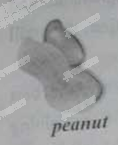题目内容
Directions: For each blank in the following passage there are four words or phrases marked A, B, C and D.Fill in each blank with the word or phrase that best fits the context.
There once was a happy monkey in the jungle. He was wandering all days, eating delicious fruit when hungry and 36 when tired. One day he came upon a house, where he saw a bowl of the most beautiful 37 . He took one in each hand and ran back into the forest.
The monkey tried to eat them, but hurt his teeth. The apples were made of wood, but they were beautiful, and when the other monkeys said that they 38 them, he held onto them even tighter.
The monkey admired his new possessions proudly as he wandered the jungle. The two apples glistened (闪亮) red in the 39 , and seemed perfect to him. He became so attached to them that he didn’t even notice his 40 at first.
A fruit tree reminded him, but he felt the apples in his hands. He couldn’t bear to set them down to reach for the fruit. In fact, he couldn’t 41 , either, if he was to defend his apples. This proud, but less happy monkey continued to walk along the forest trails (小路).
The apples became 42 , and the poor little monkey thought about leaving them behind. He was tired and hungry; he couldn’t climb trees or collect fruit with his hands 43 . What if he just let go (释放)?
Letting go of such 44 things seemed crazy, but what else could he do? He was so tired. Seeing the next fruit tree and smelling its fruit, the monkey stopped. He 45 the wooden apples and reached up for his meal. He was happy again.
Like that little monkey, we 46 carry things that seem too valuable. Letting go of them seems crazy. But 47 : only with open hands can we receive something else.
There once was a happy monkey in the jungle. He was wandering all days, eating delicious fruit when hungry and 36 when tired. One day he came upon a house, where he saw a bowl of the most beautiful 37 . He took one in each hand and ran back into the forest.
The monkey tried to eat them, but hurt his teeth. The apples were made of wood, but they were beautiful, and when the other monkeys said that they 38 them, he held onto them even tighter.
The monkey admired his new possessions proudly as he wandered the jungle. The two apples glistened (闪亮) red in the 39 , and seemed perfect to him. He became so attached to them that he didn’t even notice his 40 at first.
A fruit tree reminded him, but he felt the apples in his hands. He couldn’t bear to set them down to reach for the fruit. In fact, he couldn’t 41 , either, if he was to defend his apples. This proud, but less happy monkey continued to walk along the forest trails (小路).
The apples became 42 , and the poor little monkey thought about leaving them behind. He was tired and hungry; he couldn’t climb trees or collect fruit with his hands 43 . What if he just let go (释放)?
Letting go of such 44 things seemed crazy, but what else could he do? He was so tired. Seeing the next fruit tree and smelling its fruit, the monkey stopped. He 45 the wooden apples and reached up for his meal. He was happy again.
Like that little monkey, we 46 carry things that seem too valuable. Letting go of them seems crazy. But 47 : only with open hands can we receive something else.
| 小题1: |
|
| 小题2: |
|
| 小题3: |
|
| 小题4: |
|
| 小题5: |
|
| 小题6: |
|
| 小题7: |
|
| 小题8: |
|
| 小题9: |
|
| 小题10: |
|
| 小题11: |
|
| 小题12: |
|
小题1:C
小题2:D
小题3:D
小题4:B
小题5:B
小题6:A
小题7:A
小题8:A
小题9:D
小题10:B
小题11:D
小题12:C
文章讲述的是一个猴子因为拿着非常喜欢的木头苹果而不愿意放下,从而导致他又饿又累,最终他意识到了要想吃东西,休息,必须放开这木头苹果,从而给我们也带来启示。
小题1:句意理解,当他累的时候,他就休息一会。Rest意为休息
小题2:上下文,根据第二段的The apples were made of wood,可知,此处猴子拿走的是苹果
小题3:上下文,根据后面的he held onto them even tighter可知,其他的猴子说他们也喜欢吃这些苹果,他紧紧地抱住苹果不放、
小题4:语境,因为苹果在闪闪发光,所以肯定是在太阳的照耀下。
小题5:上下文,根据后面的A fruit tree reminded him可知,一颗果树提醒了他,他该吃动词了,所以是他非常喜欢苹果,以致于他忘记了饥饿。
小题6:句意理解,此处意为如果他要保护苹果的话,他也不能停下来。
小题7:语境,猴子越来越累,所以他感觉苹果越来越重了。
小题8:语境,因为他手里拿着苹果,所以他不能爬树去摘苹果,手里拿着苹果,即his hand full of apples.
小题9:句意理解,猴子非常珍惜,喜欢这些苹果,所以他认为放手这些珍贵的苹果看起来是疯掉了。
小题10:句意理解,根据猴子爬到了树上可知,他扔掉了苹果。
小题11:句意理解,像猴子一样,我们有时候也带着一些看起来很珍贵的东西,
小题12:句意理解,请记住,只有空着的双手才能得到别的东西。此处是作者给读者的一些启示。所用想让读者记住。
小题1:句意理解,当他累的时候,他就休息一会。Rest意为休息
小题2:上下文,根据第二段的The apples were made of wood,可知,此处猴子拿走的是苹果
小题3:上下文,根据后面的he held onto them even tighter可知,其他的猴子说他们也喜欢吃这些苹果,他紧紧地抱住苹果不放、
小题4:语境,因为苹果在闪闪发光,所以肯定是在太阳的照耀下。
小题5:上下文,根据后面的A fruit tree reminded him可知,一颗果树提醒了他,他该吃动词了,所以是他非常喜欢苹果,以致于他忘记了饥饿。
小题6:句意理解,此处意为如果他要保护苹果的话,他也不能停下来。
小题7:语境,猴子越来越累,所以他感觉苹果越来越重了。
小题8:语境,因为他手里拿着苹果,所以他不能爬树去摘苹果,手里拿着苹果,即his hand full of apples.
小题9:句意理解,猴子非常珍惜,喜欢这些苹果,所以他认为放手这些珍贵的苹果看起来是疯掉了。
小题10:句意理解,根据猴子爬到了树上可知,他扔掉了苹果。
小题11:句意理解,像猴子一样,我们有时候也带着一些看起来很珍贵的东西,
小题12:句意理解,请记住,只有空着的双手才能得到别的东西。此处是作者给读者的一些启示。所用想让读者记住。

练习册系列答案
相关题目
